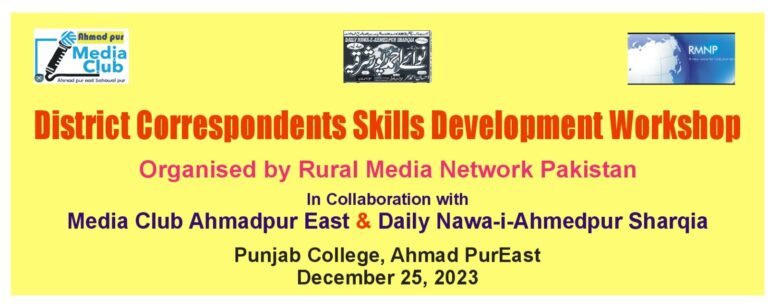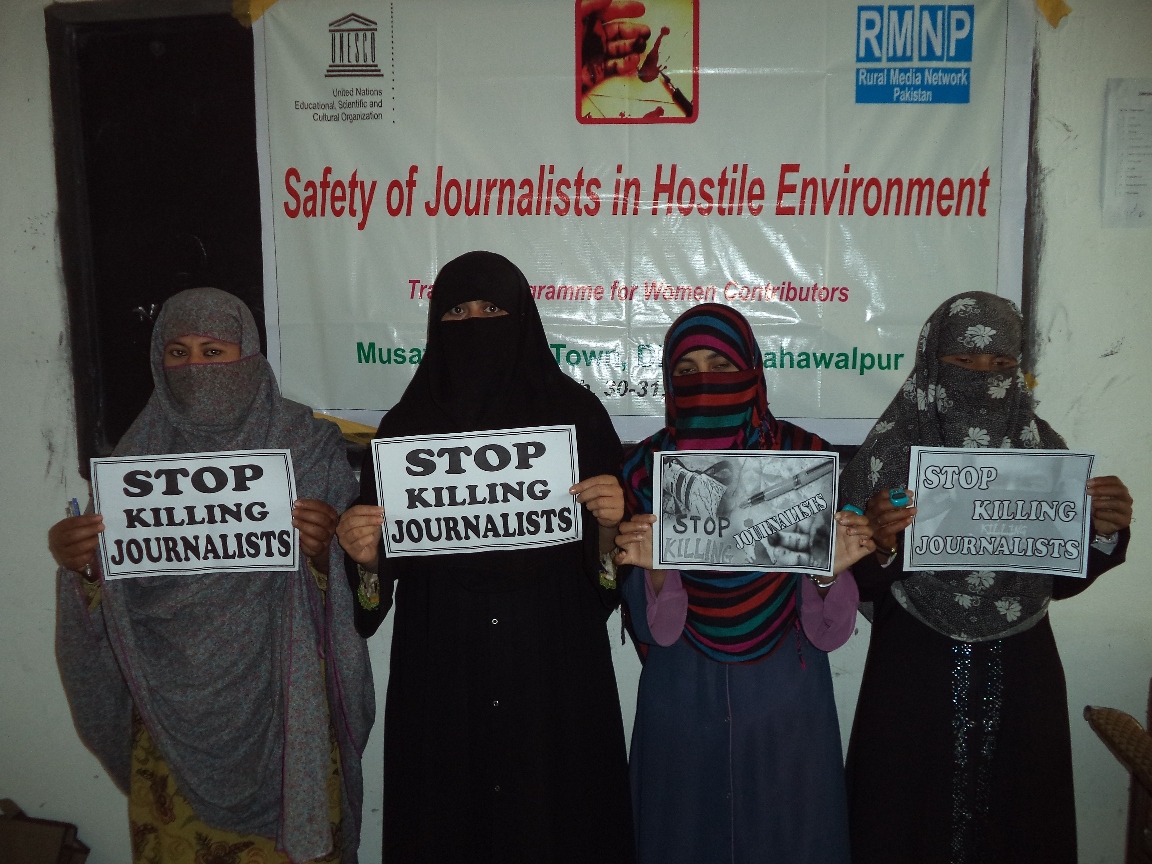Twenty Four Journalists of Riverine Areas Learn About Climate Change & Disaster Reporting
AhmedpurEast ( Rural Pakistan) Twenty four Journalists including seven female contributors hailing from riverside areas spent five days (July 4 to July 8, 2013 ) learning about climate change, the disasters it can precipitate, and how to report on the complex subject.
The Climate Change Awareness-Building workshop jointly sponsored by Rural Media Networks Pakistan and UNESCO South Asia looked at local and global factors that cause environmental problems, the adverse impact on people, and the economic cost of related disasters like flooding.
Participants discussed how reports, photo features and articles by experts help in informing the people about different aspects of the climate change issue.
Some attendees suggested that terminology is the main hurdle in covering climate change issues. A challenge is to turn scientific reports and concepts into everyday language and stories that are relevant to readers and listeners.
Pakistan is already feeling the effect of change in rainfall and river flow patterns that impact its vital agricultural sector. Food insecurity, poverty and energy issues can result, journalists were told. Participants reviewed documentaries of Pakistan’s 2010 and 2011floods, where they saw media teams carrying out the dual responsibility of covering the operation and helping the people stranded by the flooding
A field trip took participants to a small village on the south bank of the Sindh River, 120 km from Ahmedpur, which had been submerged by flood waters. The villagers showed their damaged huts to journalists and made a plea for better government compensation to reconstruct their houses. They fear more rains that will force them to move again and become homeless. At the end of the workshop participants made 11 recommendations, including a call for a separate government ministry to deal with climate change, a climate education campaign through print and electronic media, and a requirement that all development projects consider climate change effects and be fined for violating climate change standards.
Certificate giving ceremony was held on July 8,in which PML(N) MPA Qazi Adnan Farid was the chief guest.Addessing the ceremony he said that the government has been struggling to offset the crippling power crisis today. The country is grappling with worst crises due to the bad governance, poor policies and unprecedented corruption of the previous government,he added. The Punjab government wants to introduce reforms in the agriculture sector to enhance productivity and better coordination between stakeholders ultimately results in agriculture development, MPA stated. RMNP President Ehsan Ahmed Sehar chaired the ceremony while former Research Coordinator Tokyo University Japan Khalid Saeed and Coordinator RMNP Suleman Farooqi were also present on the occasion. Syed Tanveerul Hassan Bukhari acted as moderator
Qazi Adnan Farid said that developing countries like Pakistan would face multi-dimension problems in future due to climate change. The PPP government made no planning to counter the negative effects of climate change during its term in power, he claimed and termed the current spending in this regard as mere peanuts. The young MPA stated that change in climate was closely linked with to the food security and poverty of a vast majority of the country population. We need thorough research on climate change and our future development planning should accommodate new challenges, he maintained. Adnan Farid said that Pakistan still depended on agriculture. Unless we have enough water reservoirs we cannot sustain our economy, he cautioned. We have to improve our water resources which are at risk because of climate change. “Premier Nawaz Sharif and Punjab Chief Minister Shahbaz Sharif are contemplating evolving a master plan to deal with negative effects of climate change,” MPA claimed. He eulogized the services of UNESCO and RMNP for sensitizing media persons on climate change as media can focus on factors that cause environmental problems as well as its adverse impact on people
Earlier RMNP President Ehsan Ahmed Sehar highlighted the objectives of the workshop and said that it was for the first time in the history of South Punjab that 24 journalists belonging to different riverine areas of South Punjab were benefited. He informed that participants hailing from riverine areas of South Punjab learnt modern techniques from resource persons in different sessions. Disaster reporting session was also held and participants also watched different documentaries which depicted the devastation of 2010 and 2011 floods in which highways, railway tracks and bridges were swept away by floodwater.









